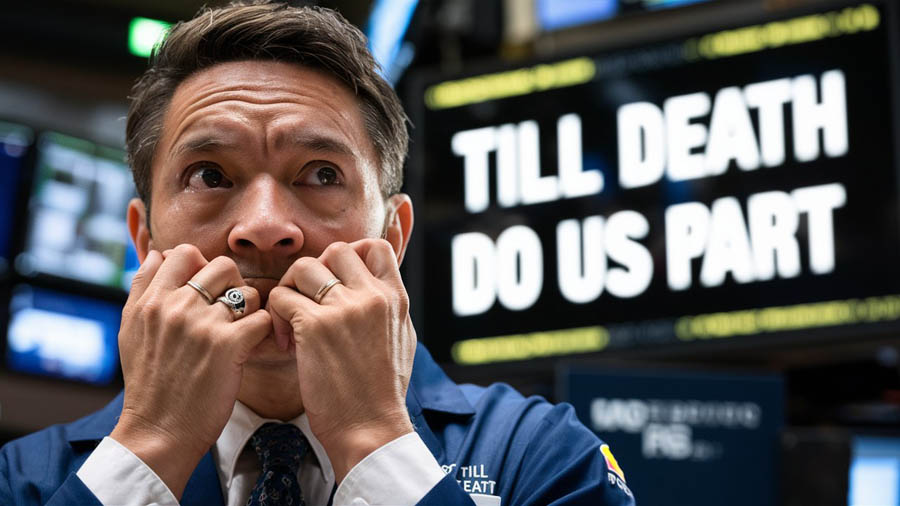Do you know that “72% of all traders in the Forex market fail”? The Forex market is one of the biggest and most liquid financial markets in the world with over 7 billion trading volume. Although trading in the forex market can be a lucrative endeavor, it also carries significant risks. Many Forex traders struggle to achieve consistent profitability, and the truth is that many of them fail. The question arises is, “Why do some forex traders fail?”

In this article, we discuss the different causes of failure among Forex traders. As such, these pitfalls will give the novice trader insight into what should and shouldn’t be done to succeed in the forex market. Choosing a regulated forex broker can also make a difference in a trader’s success.
Lack of proper education and knowledge
The first answer to the question “Why do some forex traders fail?” is the lack of proper education and knowledge about the Forex market. Trading foreign currencies is a complex activity that demands a comprehensive understanding of various factors that influence currency movements. Some key areas where traders often show deficiencies are:

Technical Analysis Skills
Many traders underestimate the importance of technical analysis, which involves reading charts and using statistical tools to predict future movements. Skills such as identifying support and resistance levels, understanding chart patterns (like head and shoulders or double tops/bottoms), and using technical indicators (like moving averages and Fibonacci retracements) are crucial. A lack of these skills can lead to misinterpreting market signals and making poor trading decisions.
Leverage and Margin Understanding
Forex markets are typically traded with leverage, meaning traders can control large positions with relatively small amounts of capital. However, misunderstanding leverage can lead to disastrous results, as it magnifies both gains and losses. You as a trader need education on how to use leverage wisely to avoid excessive risk.
Understanding Economic Indicators
Forex traders need to have a thorough understanding of economic indicators such as GDP, inflation rates, employment figures, and interest rate decisions. These indicators can significantly affect currency values. For instance, a country with rising inflation may see its currency depreciate, while one with strong economic growth might experience currency appreciation. Lacking this economic insight, you can miss the broader trends that govern currency movements.
Political and Geopolitical Events
Political events like elections, policy changes, and geopolitical tensions can cause volatile shifts in currency markets. For example, unexpected election results can lead to uncertainty and rapid changes in currency values. Traders who are not informed about these potential impacts may find themselves on the wrong side of large price movements.
Global Market Trends
The interconnected nature of global markets means that events in one part of the world can affect currency values elsewhere. For instance, a downturn in a major economy like the United States can lead to a flight to safety, with traders flocking to currencies considered safer (like the Swiss franc or Japanese yen). Without understanding these global market trends, you may not correctly anticipate shifts in currency pairs.
Lack of discipline, consistency, and time commitment in trading

Discipline is essential for sustained success in forex trading, yet many traders fail to develop or adhere to a consistent trading plan. This lack of discipline is one of the main reasons why some forex traders fail. Their inability to stick to a consistent and thought-out plan undermines their ability to trade profitably over the long term. Here’s an expanded view of how this lack of discipline affects traders:
No Trading Plan
Successful traders have a clear trading plan that defines when to enter and exit trades, how much risk to take, and what to do in different market conditions. Without this roadmap, you as a trader often make haphazard decisions. For example, you might enter a trade based on a sudden market move without considering if it fits your strategy or risk profile.
Chasing Losses or Profits
Without discipline, you may chase losses by doubling down on losing positions in the hope that the market will turn. Similarly, you might chase profits by entering trades on minimal signals after seeing others make money on similar moves. This behavior is equal to gambling rather than trading.
Ignoring Strategy Rules
If you have a strategy, a lack of discipline can lead you to ignore the rules you’ve set. For instance, if a strategy requires entering on a pullback during a trend, you might jump in too early without waiting for the pullback, fearing missing out on the move.
Emotional Overrides
Even with a plan, undisciplined traders let emotions override their rules. For example, after a series of wins, you might skip doing a proper analysis, relying on intuition or a false sense of invincibility instead of the strategy that brought you success.
Inconsistent application
Discipline is also about consistency. Traders often follow their plan in some trades but not others, or they change the plan frequently without testing the new approach. This inconsistency can lead to unpredictable results and makes it difficult to evaluate the effectiveness of their strategy.
Read More: How to Overcome Fear in Forex Trading ?
Not continuous learning and adaptability

In the Forex market, continuous learning and adaptability are not just beneficial skills; they are essential for survival and success. The inability to continuously learn and adapt is a significant factor in the question “Why do some traders fail?”.
continuous learning is vital because:
- The Forex market is influenced by an array of factors including economic indicators, geopolitical events, central bank decisions, market sentiment, etc. These elements are continuously evolving, and new strategies and technologies are always emerging.
- The Forex market is incredibly dynamic. What worked yesterday may not work today. So, traders need to stay informed about new market dynamics, trading techniques, and financial news.
- Trading strategies can become obsolete as market conditions change. Traders who continually learn are more likely to develop and refine strategies that are effective under current market conditions.
- As markets evolve, so do the risks involved in trading them. Traders who update their risk management practices can protect their investments.
- With the rise of algorithmic trading, artificial intelligence, and machine learning, traders need to keep up with technological trends that can significantly impact the Forex market.
Moreover, adaptability goes hand-in-hand with continuous learning. It’s about applying what you learn to adjust your trading approach in response to market changes. In continuing, we explore it in more detail.
Rigid Trading Strategies
Believing that a single trading strategy will continuously yield successful trades is one of the reasons “why do forex traders lose?”. Some traders rely on fixed strategies that may work well under specific conditions but fail miserably when those conditions change. For example, a strategy that works in a trending market may not be suitable in a range-bound market.
Markets are dynamic, not static. If they were unchanging, trading them would be impractical. Due to the ever-evolving nature of the markets, you must develop the skill to identify these changes and adapt to any new circumstances that arise. If you cannot adapt to these shifts, it is more likely to be left behind, suffering from poor performance and losses.
Failure to Recognize Economic Shifts, Geopolitical and Global Events
Economic news and events significantly impact currency markets. Traders who fail to account for major economic releases (like changes in employment rates, interest rate decisions, or economic growth figures) may find their strategies out of alignment with market realities. Adapting to these changes requires staying informed and being ready to modify your approach in response to new economic data.
Beyond economic news, geopolitical tensions, elections, policy changes, and unexpected global events can also alter market sentiment and dynamics. If you ignore these factors or fail to react appropriately, you may see your strategies falter as the market moves against you.
Technological Ignorance
In today’s trading environment, technology plays a crucial role. Automated trading systems and algorithms can change market conditions in seconds. failing to use or understand these tools might cause rapid shifts in market sentiment or failure to execute trades at the optimal time.
Persistence in Unprofitable Strategies
A significant adaptation failure is the inability to stop using strategies that no longer work. As was said, markets evolve, and what worked yesterday might not work today. You should review your performance and be willing to stop using or change strategies that consistently produce losses.
Neglecting Deliberate Practice, Strategy Validation, and Self-Evaluation
Forex trading is complex and demands a disciplined, systematic approach to understand and capitalize on market movements effectively. Many traders, however, do not engage in continuous practice, back-testing, or keep a detailed trading journal. This is not due to a lack of knowledge or technical skills, but rather a lack of thorough preparation and discipline. That’s why some forex traders fail. They underestimate the importance of these key strategies, which are crucial for success in this highly volatile market. The reasons behind that are:
Lack of continuous practice
The forex market is a dynamic environment that requires traders to continuously hone their skills and stay sharp. Without regular practice, you may lose your edge, become rusty, and struggle to execute your strategies effectively. Consistent practice helps maintain your proficiency in areas such as risk management, trade execution, and emotional control, which are crucial for successful trading.
Insufficient back-testing:
Back-testing is the process of applying a trading strategy or system to historical market data to evaluate its performance and potential profitability. Failing to back-test trading strategies thoroughly can lead to unrealistic expectations, flawed assumptions, and ultimately, losses. Back-testing allows you to identify potential flaws, optimize your strategies, and gain confidence in your approach before risking real capital.
Not maintaining a trading journal
A trading journal is a comprehensive record of a trader’s trades, including entry and exit points, reasons for taking the trade, emotions experienced, and overall performance. If you neglect to maintain a trading journal, you find it challenging to identify patterns, analyze mistakes, and track progress over time. A well-kept trading journal serves as a valuable tool for self-reflection, enabling you to learn from your experiences and make informed adjustments to your trading approach.
Poor risk and capital management

It would definitely be said that poor risk and capital management is one of the most important reasons “why do most forex traders fail?”. To survive in the volatile forex market, risk management is an essential requirement for a successful trader. Here are more detailed aspects of where traders falter in risk management:
Over-Leveraging
One typical error is using too much leverage without considering the downside risks that come with it. For instance, if a trader uses a 100:1 leverage ratio, any slightest move against him will result in a significant loss. Traders tend to overestimate their ability to withstand these moves, risking too much capital on a single trade.
Ignoring Stop-Loss Orders
A stop-loss order is a tool used by traders to protect themselves from massive losses. However, many traders either place too tight stops (which leads to being stopped out prematurely) or wide ones (as they become prone to big losses). Some traders simply don’t use stop-loss orders at all hoping that prices will turn around immediately for them which consequently can result in irrevocable losses due to sharp changes in the market prices.
Read More: How to Overcome Greed in Forex Trading ?
Poor Position Sizing
Many traders fail to adjust their position sizes according to the volatility and total account balance. For instance, taking a large position in a highly volatile market can result in significant losses. Position sizing should be based on the total capital and the risk tolerance of the trader, ensuring that no single trade can significantly impact the account.
Neglecting Diversification
While forex traders primarily focus on currency pairs, ignoring diversification can lead to high risk. For example, trading multiple pairs that are highly correlated (like EUR/USD and GBP/USD) can amplify risks. Traders should understand correlations and diversify their trades to manage risk better.
Emotional Decision Making

When considering the question, “Why do some forex traders fail?”, one significant factor to examine is the impact of emotional decision-making. The forex market is characterized by high volatility, which can elicit strong emotional responses from traders. These emotions can often cloud judgment and result in poor trading decisions. Here’s a deeper look into how emotions affect trading:
Fear and Greed
These are two emotions that frequently affect traders. Fear can cause you to close positions prematurely or to avoid taking necessary risks. Conversely, greed can lead you to take excessive risks or to stay in profitable trades too long, hoping for even more gain, only to see those profits evaporate.
Overconfidence
After a series of successful trades, it is more likely to become overconfident. This can lead you to ignore your trading plans, take on too much risk, or enter trades without sufficient analysis, believing you can do no wrong.
Impatience
The forex market requires patience, as profitable setups might not occur every day. Impatient traders often enter trades without proper signals, driven by the desire to make quick profits or simply to “be in the market.”
Revenge trading
After a loss, traders often try to quickly take back what they’ve lost, a behavior known as revenge trading. This emotional response leads you to rash decisions, where you increase your trade sizes or take ill-considered positions without proper analysis, compounding your losses.
Stress and Burnout
Continuous monitoring of markets, especially in forex which operates 24 hours a day, can lead to stress and burnout. Traders under stress are more likely to make unplanned and poorly thought-out trades. Managing emotional health is crucial for maintaining a clear mind and making rational trading decisions.
Having Unrealistic Expectations

Many individuals are drawn to forex trading by the allure of quick and large profits, often influenced by stories of traders who supposedly turned small amounts of capital into vast fortunes overnight. However, the reality of forex trading is far from these exaggerated narratives.
To answer the question, “Why do most forex traders lose money?”, you must understand that forex trading is not a get-rich-quick scheme but a complex discipline that requires time, patience, and consistent effort. Success in the forex market comes from a long-term commitment to learning, practicing, and refining trading strategies. Proficiency in trading is more akin to a marathon than a sprint, where traders develop skills and accumulate profits over time through diligence and persistent learning.
Overtrading

Overtrading is a prevalent issue that plagues many forex traders, often leading to significant losses and diminished trading capital. This problem typically manifests in several harmful behaviors:
Compulsive Trading
Some traders develop an addictive-like behavior towards the thrill of trading. This addiction compels them to stay actively trading, constantly looking for new opportunities regardless of whether these opportunities fit within their established trading criteria. This need to be in the market can lead to making suboptimal trades just for the sake of trading.
Read More: Market Makers in Forex Market
Deterioration of Trading Standards
When traders overtrade, they often abandon their carefully thought-out criteria for entering and exiting trades. They might take positions that do not meet their usual requirements in terms of risk-reward ratio, and signal strength, or conform to their strategic guidelines. The more they engage in this behavior, the more they dilute the effectiveness of their strategy, leading to increased risk and unnecessary losses.
Increased Transaction Costs
Overtrading doesn’t just increase risk; it also inflates transaction costs. Each trade comes with its costs (like spreads and commissions), and excessively increasing trade volume means these costs accumulate rapidly, eating into any profits and enhancing losses.
Emotional Exhaustion and Poor Decisions
Constant trading puts a psychological strain on traders, leading to fatigue and emotional exhaustion. This tiredness can impair judgment and decision-making skills, resulting in even more trading mistakes and an inability to follow planned strategies.
Lack of Patience and Discipline
Often, overtrading is a symptom of deeper issues like a lack of patience and discipline as mentioned earlier. Traders may feel the urge to “do something” especially if the market is not providing clear signals according to their strategy. This impatience pushes them to make hasty decisions, leading to poor trading outcomes.
Now that we explored the reasons “why do some forex traders fail?”, it is time to know the percentage of forex traders who lose their money. Knowing about these statistics helps you to be aware and more cautious.
what percentage of forex traders lose money?

According to official data from 32 brokers regulated by ESMA (the European Securities and Markets Authority), the research reveals that an average of 72.2% of forex traders experience losses.
The availability of this data is due to the requirement imposed by ESMA on forex and CFD brokers to disclose the percentage of their clients who lose money. Brokers are even mandated to include this information in their advertisements, promoting transparency and awareness among traders.
Conclusion
The question “Why do some forex traders fail?” has a multitude of answers. The lack of proper education and training, insufficient risk management, emotional trading, and overleveraging are some of the most common reasons. It’s crucial to approach forex trading as a serious profession, dedicating time and effort to learning and practicing before expecting significant returns. By understanding and avoiding these common pitfalls, you can increase your chances of success in the dynamic and exciting world of forex trading.
What if I lose all my money?
Only trade with what you can afford to lose. Forex can be volatile, and losses are a natural part of the experience.
Do I need a lot of money to start forex trading?
No, you don’t need a fortune. Many brokers offer micro-accounts with lower minimum deposits. However, focus on learning before risking significant capital.
Are there any shortcuts to becoming a successful forex trader?
Unfortunately, there are no shortcuts. Success takes time, dedication, and consistent learning.






